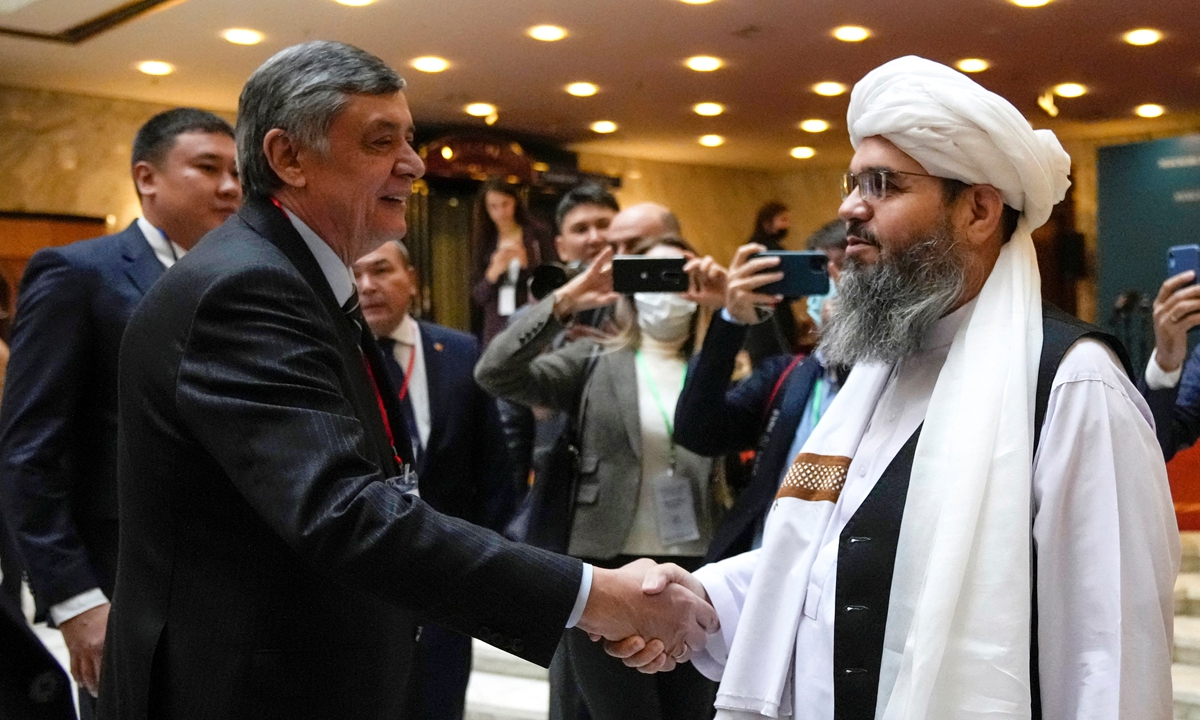
Russian presidential envoy to Afghanistan Zamir Kabulov (L) shakes hands with a member of the Taliban delegation Mawlawi Shahabuddin Dilawar prior to an international conference on Afghanistan in Moscow on October 20, 2021. Photo:AFP
The "Moscow format" talks on Wednesday highlighted the prominent role of China-Russia coordination on the Afghan crisis when the US and some Western countries chose to evade responsibility, experts said, as Moscow gathered 10 countries and the Taliban to focus on the developing political and military situation in Afghanistan.
Participants at the meeting proposed to convene the UN-led donor conference to help rebuild the country. It should take place “certainly with the understanding that the core burden... must be shouldered by troop-based actorswho were in the country for the past 20 years.” It refers to the US and its allies who invaded Afghanistan.
Russia's Foreign Ministry said the political and military situation of Afghanistan will be the focus of this meeting in Moscow. The agenda also includes the establishment of an inclusive government and efforts for a global response to prevent a humanitarian crisis.
It has been a diplomatic tradition of Russia to lead a multilateral mechanism that involves regional and relevant parties to coordinate and cope with crises. And gathering Afghanistan's neighboring countries to this meeting is beneficial to address their concerns, build consensus and help Afghanistan seek a way out in the future, Wang Jin, an associate professor at the Institute of Middle Eastern Studies of Northwest University, told the Global Times on Wednesday.
According to Anadolu Agency, the "Moscow format" was a mechanism established in 2017 for the Afghanistan issue, and it includes China, Pakistan, Iran, India, and Afghanistan. Experts believe this platform shed lights on the prominent role of China-Russia coordination and cooperation on the Afghan crisis.
China and Russia are involved in many multilateral mechanisms to address Afghanistan's concerns and establish cooperation, including the Shanghai Cooperation Organization, which focuses on security issues.
China-Russia coordination in Afghanistan could be comprehensive, ranging from humanitarian aid, the recognition of the new government, refugee issues and how to manage terrorism and share intelligence, not like some Western countries that offer help only when their political preconditions are met, Wang noted.
A day before the meeting, the Russian Foreign Ministry said on Tuesday after talks with Chinese and Pakistani officials that the three countries are willing to provide humanitarian aid and economic support to Afghanistan.
Just one day after the Afghan Taliban announced a new interim government, Chinese State Councilor and Foreign Minister Wang Yi announced in early September that China will provide Afghanistan with 200 million yuan ($31 million) worth of grain, winter supplies, vaccines and other medicine in line with the needs of the Afghan people.
Media reported that the US, though invited, is not attending. Russian Foreign Minister Sergei Lavrov said Moscow regrets the absence of US officials from international talks.
Wang said the US' absence reflects its escapist psychology of being irresponsible on Afghan issues.
As a prime culprit of the Afghan crisis, the US should shoulder major responsibility on contributing humanitarian aid to the country, where all kinds of aid were in urgent need as winter approaches. But the US requested the Afghan Taliban to meet certain requirements in regard to the political system, religious policy, and policies on women's and children's rights, before they provide aid to the war-torn nation, Wang noted.
Another reason why the US dodged this Russia-led meeting is that the US is fettered by its own "principles" on the Afghan issue, that it rejects the legitimacy of the Taliban but still hopes to engage in dialogue with the group. The two only engaged in the Doha dialogue mechanism, but refrained from conducting dialogue in other mechanisms, said Wang.




